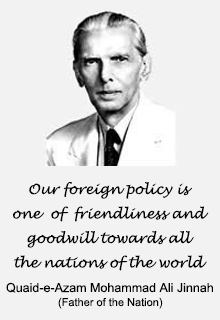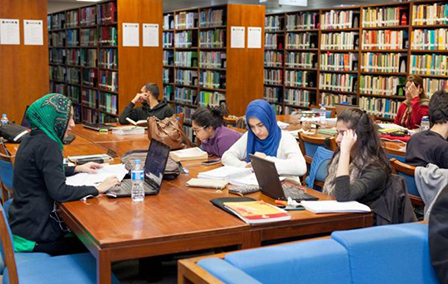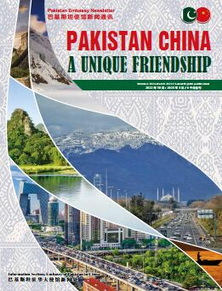

Pakistan Study Centers

Confucius Institute in Pakistan

Advisory for Students

Embassy College

Embassy of Pakistan Newsletter
News & Events
OPENING CEREMONY OF BOAO FORUM FOR ASIA STATEMENT BY PRIME MINISTER OF PAKISTAN H.E. SHAHID KHAQAN ABBASI
April 10,2018
Your Excellency,
President Xi Jinping,
Madame Peng Liyuan;
Chairman Yasuo Fukuda;
Secretary General Zhou Wenzhong,
Distinguished leaders;
Excellencies;
Ladies and Gentlemen,
It is both a pleasure and a privilege to be addressing this august gathering of eminent luminaries.
Let me at the outset thank our hosts, the Boao Forum and the Government of the People’s Republic of China for extending us, as always, very warm and generous hospitality.
I am greatly pleased to be in the beautiful island of Hainan, which is known for its enterprising spirit and dynamic people. Hainan’s transformation mirrors the profound changes underway in China and the rest of Asia.
Our heartiest felicitations to President Xi Jinping on the successful conclusion of the Two Sessions and his re-election as the President. Under his sagacious leadership, China, I am convinced, will continue to march forward along the path of National Rejuvenation.
The Boao Forum has emerged as a leading platform shaping international discourse on Asia and its place in the world. This year’s theme ‘An Open and Innovative Asia for a World of Greater Prosperity’ aptly puts into context the promise before us today.
Today, humanity stands at the cusp of fundamental technological breakthroughs. The Fourth Industrial Revolution is upon us, and technologies such as Artificial Intelligence, Robotics, Biotechnology, and Quantum Computing are set to enter our lives and reshape them. These forces of change challenge us to engineer anew our models of governance and business.
The global economic outlook is more sobering. The trading regime underpinned by WTO is eroding. The distance between the global haves and have-nots, within countries, and between the richest and poorest segments of our societies has been expanding. The dark clouds of protectionism are getting darker.
As nations look inward, and turn their backs on globalization, we in Asia confront a strategic choice: Whether to follow suit, or to script an alternative, more hopeful vision for our future.
Ladies and Gentlemen,
As home to the majority of the world population, custodian of a large portion of its natural resources and a conduit for trade by land and sea, Asia continues to demonstrate its growing centrality to the economic order.
In 2017, nearly one-third of worldwide economic growth came from the Asia-Pacific region, the bulk of it from China. As the Asian Century dawns, it is incumbent upon us to realize our real potential and rediscover the wisdom that resides within.
Our coordinated and tailored approaches must incorporate the enterprising spirit of our peoples and their common aspirations for a better life. They must include embracing structural reform, strengthening regional institutions, increasing connectivity, leveraging technology and investing in human capital.
Ladies and Gentlemen,
Pakistan views China’s meteoric rise and growing stature with immense satisfaction and great pride. Over four decades of reform, China has achieved enviable growth, lifted hundreds of millions out of poverty and transformed the face of the global economy.
Today, China is a global leader in addressing climate change, on global trade, in promoting equitable development and a sustainable world. I am happy to note that this Conference will have dedicated sessions on China’s successful journey of reform.
President Xi’s historic Belt and Road Initiative has become a global public good, beneficial to all and bringing equality to an unequal world. This visionary and futuristic initiative is a win-win proposition aimed at bringing shared prosperity for all. Pakistan sees it as an initiative of generational impact which will shape the course of the 21st century. Supplemented by the Asian Infrastructure Investment Bank and the Silk Road Fund, Belt and Road Initiative has spawned innovative mechanisms for development funding, which are bridging the resource gap between the needs of the developing countries and capabilities of existing International Financial Institutions.
Excellencies,
In the annals of history, Sino Pakistan relations find no parallel. In every sense, we are iron brothers. In our region, our friendship is the bedrock of strategic stability. It is but natural for Pakistan to take the lead in partnering with China to usher in a new era of peace and prosperity through enhanced connectivity.
In Pakistan today, step by step, brick by brick, a brave new Asia is taking shape. The China Pakistan Economic Corridor, the flagship project of BRI is fast reaching fruition. It is an excellent example of an open, coordinated, and inclusive development paradigm that benefits all stakeholders.
At the southern tip of this Corridor, development of the deep seaport of Gwadar is proceeding at a fast track. On completion, it will not only serve as a transit and transshipment hub, but become an economic nucleus. Besides Pakistan, it will afford shortest maritime and overland access to Western China, Central and South Asia and the Middle East.
We have already begun reaping dividends of CPEC rail, road and infrastructure projects. CPEC investment and its spin off effects have generated thousands of jobs. 10,000 MW have been added to our national grid, ameliorating our chronic energy shortages.
Establishment of several Special Economic Zones (SEZs) along our highways and motorways is integral to CPEC plans. Pakistan aims to offer tailored incentive packages for the SEZs. We are confident that these zones will catalyze the development of innovation-based industries in Pakistan.
Ladies and Gentlemen,
Pakistan’s economy is growing at around 6percent per annum, the highest in a decade. Our capital markets have lately been upgraded from Frontier to Emerging market status. Over the medium-term, our growth rates are expected to surpass global averages. And by 2050, we will be the world’s fifteenth largest economy.
Our population of 207 million reflects immense human resource potential besides a large consumer base. Gelled together, these two intrinsic strengths portend immense business opportunities. Take telecom, and IT. Pakistan is home to 140 million cellular subscribers. Internet and broadband services have penetrated every nook and corner of the country.
Our e-commerce is projected to grow into a multibillion dollar industry. Lately, giants such as Ali Baba and telecom sector companies from around the globe, have shown strong interest in setting up facilities in Pakistan. It is our earnest desire to see the arc of investment expand further, and to welcome entrepreneurs and investors from around the world to our SEZs.
Connectivity remains the cornerstone of our plans, and is a major driving force behind our overlapping membership of regional platforms of ECO, SAARC and SCO. It is also our desire to see the networks of highways, railways, energy grids and connectivity nodes spread organically region-wide.
For the same reason, we have consistently supported trans-regional projects such as TAPI and CASA-1000. As a new member of SCO, Pakistan aims to play a most productive role in utilizing this platform to integrate further with the region.
Ladies and Gentlemen,
I firmly believe that development and security remain intrinsically indivisible. Only by spreading the dividends of open trade and shared innovation will we be able to promote tolerance and amity and deny space to extremism. The China-Pakistan-Afghanistan trilateral framework is aimed at achieving these very objectives.
Ladies and Gentlemen,
The fabled Silk route reminds us that innovation blossoms in the rich milieu of openness. One, where cultures & commerce; ideas and information; goods & services; consumers & capital, move and mingle freely. That highway is our proud, common heritage. In the BRI we have the opportunity to recreate our future in the image of its glorious legacy.
Let me conclude with a Chinese saying that, “The man who moves mountains begins by carrying away small stones.” It is time to lift stones; it is time to move mountains.
I thank you all.



.jpg)
.jpg)
.jpg)
.jpg)
.jpg)
.jpg)
.jpg)







